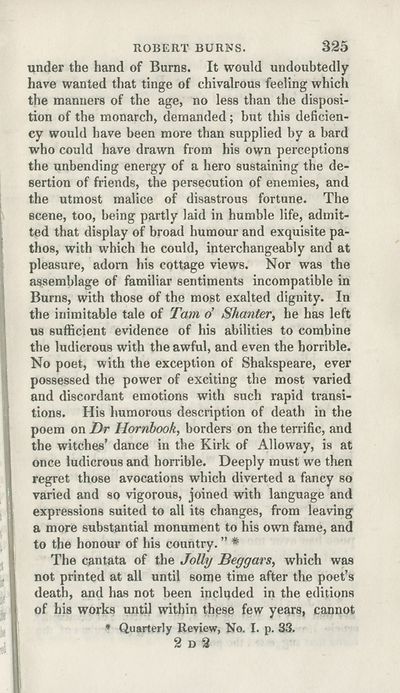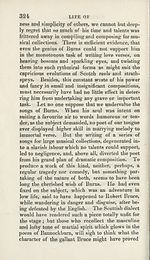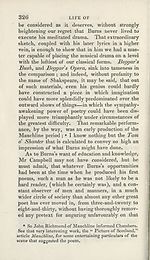Scotland/Scots > Life of Robert Burns
(335)
Download files
Complete book:
Individual page:
Thumbnail gallery: Grid view | List view

ROBERT BURNS. 325
under the hand of Burns. It would undoubtedly
have wanted that tinge of chivalrous feeling which
the manners of the age, no less than the disposi¬
tion of the monarch, demanded ; but this deficien¬
cy would have been more than supplied by a bard
who could have drawn from his own perceptions
the unbending energy of a hero sustaining the de¬
sertion of friends, the persecution of enemies, and
the utmost malice of disastrous fortune. The
scene, too, being partly laid in humble life, admit¬
ted that display of broad humour and exquisite pa¬
thos, with which he could, interchangeably and at
pleasure, adorn his cottage views. Nor was the
assemblage of familiar sentiments incompatible in
Burns, with those of the most exalted dignity. In
the inimitable tale of Tam o’ Shanter, he has left
us sufficient evidence of his abilities to combine
the ludicrous with the awful, and even the horrible.
No poet, with the exception of Shakspeare, ever
possessed the power of exciting the most varied
and discordant emotions with such rapid transi¬
tions. His humorous description of death in the
poem on Dr Hornbook, borders on the terrific, and
the witches’ dance in the Kirk of Alloway, is at
once ludicrous and horrible. Deeply must we then
regret those avocations which diverted a fancy so
varied and so vigorous, joined with language and
expressions suited to all its changes, from leaving
a more substantial monument to his own fame, and
to the honour of his country. ” *
The cantata of the Jolly Beggars, which was
not printed at all until some time after the poet’s
death, and has not been included in the editions
of his works until within these few years, cannot
* Quarterly Review, No. I. p. 33.
2 D 2
under the hand of Burns. It would undoubtedly
have wanted that tinge of chivalrous feeling which
the manners of the age, no less than the disposi¬
tion of the monarch, demanded ; but this deficien¬
cy would have been more than supplied by a bard
who could have drawn from his own perceptions
the unbending energy of a hero sustaining the de¬
sertion of friends, the persecution of enemies, and
the utmost malice of disastrous fortune. The
scene, too, being partly laid in humble life, admit¬
ted that display of broad humour and exquisite pa¬
thos, with which he could, interchangeably and at
pleasure, adorn his cottage views. Nor was the
assemblage of familiar sentiments incompatible in
Burns, with those of the most exalted dignity. In
the inimitable tale of Tam o’ Shanter, he has left
us sufficient evidence of his abilities to combine
the ludicrous with the awful, and even the horrible.
No poet, with the exception of Shakspeare, ever
possessed the power of exciting the most varied
and discordant emotions with such rapid transi¬
tions. His humorous description of death in the
poem on Dr Hornbook, borders on the terrific, and
the witches’ dance in the Kirk of Alloway, is at
once ludicrous and horrible. Deeply must we then
regret those avocations which diverted a fancy so
varied and so vigorous, joined with language and
expressions suited to all its changes, from leaving
a more substantial monument to his own fame, and
to the honour of his country. ” *
The cantata of the Jolly Beggars, which was
not printed at all until some time after the poet’s
death, and has not been included in the editions
of his works until within these few years, cannot
* Quarterly Review, No. I. p. 33.
2 D 2
Set display mode to:
![]() Universal Viewer |
Universal Viewer | ![]() Mirador |
Large image | Transcription
Mirador |
Large image | Transcription
| Antiquarian books of Scotland > Scotland/Scots > Life of Robert Burns > (335) |
|---|
| Permanent URL | https://digital.nls.uk/108249879 |
|---|
| Description | Thousands of printed books from the Antiquarian Books of Scotland collection which dates from 1641 to the 1980s. The collection consists of 14,800 books which were published in Scotland or have a Scottish connection, e.g. through the author, printer or owner. Subjects covered include sport, education, diseases, adventure, occupations, Jacobites, politics and religion. Among the 29 languages represented are English, Gaelic, Italian, French, Russian and Swedish. |
|---|

